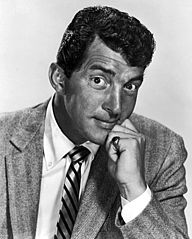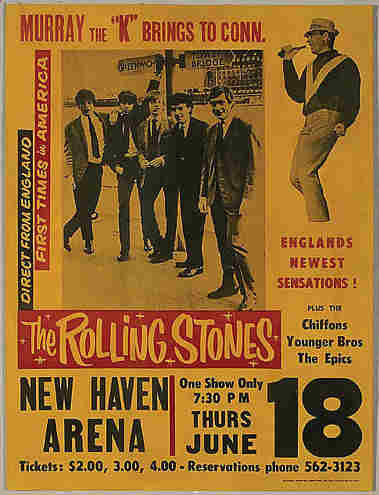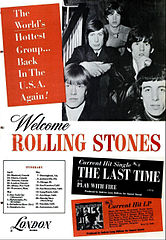Throwing Stones VI: Hey, Hey, Heyday
(For Part V, click Throwing Stones V: The Uncanny Accountant.)
In Part V, accountant Allen Klein rose from a New Jersey orphanage to become the manager of legendary soul artist Sam Cooke, then began connecting with the English rock scene.
 The Beatles chalked up six #1 U.S. hits in 1964. Their TV appearances shattered audience records, and their American tour was a runaway success. By the end of the year, English acts accounted for more than a third of all the singles to reach the American top ten. The British Invasion was rolling across the pop cultural landscape like a mechanized division. But the Rolling Stones were stuck in the trenches.
The Beatles chalked up six #1 U.S. hits in 1964. Their TV appearances shattered audience records, and their American tour was a runaway success. By the end of the year, English acts accounted for more than a third of all the singles to reach the American top ten. The British Invasion was rolling across the pop cultural landscape like a mechanized division. But the Rolling Stones were stuck in the trenches.

Depending on who tells the story, the band’s first U.S. tour was either a difficult audience-building exercise or an outright disaster. With no big American hits, little press coverage, too many empty seats and only one major TV appearance, during which host Dean Martin mocked them, the Stones struggled every step of the way.
That summer of ’64 slog kicked manager Andrew Loog Oldham’s cockiness where it hurt. America’s brash capitalism and no-holds-barred business practices clobbered his confidence, while the country‘s size, wealth and strangeness overwhelmed his self-importance. In Oldham’s defense, the rock concert business was still in its infancy, and local promoters ranged from conscientious pros to skirt-chasing shysters to cattlemen booking state fairs. Profitable tours from across the pond were tricky propositions at best.
None of this was lost on Allen Klein.
Klein was managing Sam Cooke when the Stones decided to cover “It’s All Over Now,” a song written by the Womack brothers. The Womacks were signed to Cooke’s publishing company and record label. Their version of “Over,” released under the name The Valentinos to avoid upsetting their gospel fans, had just cracked the American charts.

Oldham broke away from the tour to meet with Sam Cooke’s “publishing guy” (most likely J.W. Alexander, the African American musician and entrepreneur who co-owned the publishing and record companies with Cooke). Klein and Cooke blessed the Stones’ cover of “It’s All Over Now,” infuriating the Womack brothers. Rushed into release, the Stones’ version made it to the mid-twenties on the U.S. charts, scuttling the Womacks’ record. It shot to the top slot in England and was a hit in Europe as well. The Womacks understood the wisdom of Cooke and Klein’s decision as soon as their songwriting royalties began gushing in.
 The Stones’ stateside fortunes changed dramatically when the band returned to America in the fall of 1964. “Time Is On My Side” was riding the rising tide of Brit hits into the top ten. Buoyed by a late October appearance on The Ed Sullivan Show, the Stones began playing to full houses, and firmly established their anti-Beatles image in the U.S.
The Stones’ stateside fortunes changed dramatically when the band returned to America in the fall of 1964. “Time Is On My Side” was riding the rising tide of Brit hits into the top ten. Buoyed by a late October appearance on The Ed Sullivan Show, the Stones began playing to full houses, and firmly established their anti-Beatles image in the U.S.
Allen Klein and J.W. Alexander travelled to London on business shortly after Sam Cooke’s death. In a meeting with Andrew Loog Oldham, the Stones manager tried to arm-twist half of the publishing rights to “It’s All Over Now” out of Klein. Oldham claimed that, since his boys had made the song a hit, he was entitled to a kingsized piece of the action. It was an old music business ploy. Klein refused the request.
Klein must have been both impressed with Oldham’s brass and amused by the young man’s lack of experience. Clearly, Andrew Loog Oldham did not know who he was dealing with.
Though Allen Klein was famous for his piss and vinegar approach, he knew when to go with milk and honey instead. Having studied the Stones in detail, Klein came to the meeting prepared. He presented himself as an experienced professional with expert knowledge of the music business, which he was. He also presented himself as a father figure and ideal mentor to Oldham, which he may not have been.
Klein heaped praise on Oldham and his boys. Oldham poured his heart out to Klein, who seemed to know every problem the rattled young manager had encountered in the U.S. before the Brit could put it into words. Klein offered helpful suggestions, bashed big record company bumblers and dazzled Oldham with his mathematical mind. Andrew Loog Oldham appeared to have found a friend in America at last.
Klein returned to the states and consolidated his ownership of Sam Cooke’s copyrights, recorded catalog and image. Klein purchased the Cooke estate’s share of those properties from Cooke’s widow, Barbara. He also bought out J.W. Alexander, who felt too grief stricken to carry on with day-to-day business.
 The production team of Hugo & Luigi, who had worked on many of Cooke’s hits and owned an interest in some of his projects, turned down Klein’s buyout offers. The producers claimed that Klein responded by stonewalling them, making it impossible to learn what was going on with their stake in Cooke’s legacy. The duo eventually sold to Klein out of sheer frustration.
The production team of Hugo & Luigi, who had worked on many of Cooke’s hits and owned an interest in some of his projects, turned down Klein’s buyout offers. The producers claimed that Klein responded by stonewalling them, making it impossible to learn what was going on with their stake in Cooke’s legacy. The duo eventually sold to Klein out of sheer frustration.
What 1964 did for the Beatles, 1965 did for the Stones. The Jagger-Richards songwriting team charged ahead, generating outstanding material under siege conditions. “Satisfaction” welded lyrics bemoaning the frustrations of consumer and romantic desire to one of the all-time great guitar riffs. It hit number one in the States on July 10 and held the top slot for four weeks, becoming the signature song of the summer. “Satisfaction” put The Rolling Stones over the top in a way nothing else had. “Get Off Of My Cloud” was a suitably feisty, funny follow-up. It became their second American number one.
Building on the success of their summer tour, the band returned to the U.S. in the winter of 1965. They played to an estimated 250,000 fans in five weeks. The Rolling Stones had conquered America. And Allen Klein had become their new co-manager.
(This concludes Part VI. Click now to read Throwing Stones VII: Mister Ed)
Andy A.
Excellent work, again. Waiting for the part where Keith Richards gets electrocuted while touching a microphone at a Sacramento show, dies, and lives to tell about it.
George B.
Having seen them all on the tube, I remember the events that put the Stones where they hang today very well. The business background behind it all is actually far more interesting to me now than the band itself. Who knew? Back then, I would have said, “Who Cares!” I agree with Andy’s comment, and think bizarre backstage events would make a fine blog topic. Keith Richards is, no doubt, a zombie. How ’bout filling in the in the gruesome details of that true story?
Bill
Look out, George, he’s right behind you! Nooooo…
DG
Always picking up tidbits and love the humor! Keep ‘em coming!
Bob
The signature song of Summer ’65 IMO was “Like a Rollling Stone” but that’s pretty much arguable, I grant you.